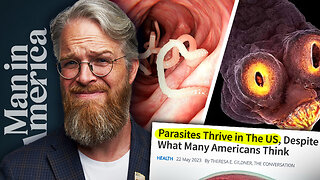Premium Only Content

Episode 3230: Order of Loves: Restless Until We Rest in Christ
www.catholic-reboot.com
Nightly Zoom Coordinates for Rosary:
Meeting ID: 865 8978 0399
Passcode: Wjjv4960!
Speak Lord for your Servant is Listening
Book Recommendation of the Day
St. Augustine – On Christian Doctrine (De Doctrina Christiana)
• Here Augustine explains his distinction between things to be used (uti) and things to be enjoyed (frui).
• Only God is to be enjoyed for His own sake; everything else must be used in reference to Him.
• Quote (Book I, ch. 22):
“To enjoy something is to cling to it with love for its own sake. To use something is to apply it to what you love… If we, who enjoy, love anything other than God, we are bound in misery.”
In the years following the Second World War, the Catholic Church in the West stood as a fortress of truth, beauty, and tradition. The Baby Boomer generation inherited a treasury of faith: the Mass of the Ages, devotions that sanctified daily life, and a culture in which the sacred shaped the rhythms of society. Yet, instead of guarding this treasure, many allowed it to slip through their fingers.
Why? Because their love became disordered. As St. Augustine taught, “My weight is my love; by it I am carried wherever I am carried.” When love is rightly ordered, it carries us to God. But when it is disordered, it carries us downward to self, to possessions, to comfort. Rather than loving God with all their heart, soul, and strength, as Christ commanded in the Gospel of St. Matthew “You shall love the Lord your God with all your heart, and with all your soul, and with all your mind” (Mt. 22:37) many Boomers preferred to love themselves. They sought security, prestige, and comfort. And when the storms of the 1960s came the cultural upheavals, the sexual revolution, and the confusions following Vatican II too many chose a faith that demanded less.
They clung not to the rugged Cross of Calvary, but to a watered-down religion that could coexist with their desires. Pope St. Pius X foresaw this danger when he warned: “The great movement of apostasy being organized in every country for the establishment of a One-World Church which shall have neither dogmas, nor hierarchy, nor discipline for the mind, nor curb for the passions.” His words speak directly to the Novus Ordo mentality: a faith reduced, a devotion diluted, and sacrifice abandoned.
But here is the good news God, in His providence, has not abandoned His Church. A younger generation, raised in the rubble left behind, has begun to hunger for what their parents and grandparents lost. They look at empty parishes, broken families, and a shallow catechesis that failed to inspire, and they say: enough. They are rejecting the false promises of comfort and compromise. They are returning to the Traditional Latin Mass, to the devotions that formed saints, and to the hard but beautiful path of authentic Catholic life.
And even more striking, we see conversions among the young not to a diluted Catholicism, but to Tradition itself. Young men and women, often raised with little or no faith, are discovering the Mass of the Ages and falling in love with it as if they had found buried treasure. They recognize in it the truth and beauty their souls were made for. In the words of the Psalmist: “Taste and see that the Lord is good” (Ps. 34:8).
So while one generation squandered the inheritance, another is reclaiming it. The story is not one of despair, but of hope. God is raising up a remnant who are not satisfied with a lesser love, but who long to love Him above all things with the fullness of devotion, reverence, and sacrifice. The Baby Boomers may have turned away, but the youth are turning back. And in this great return to Tradition, we see the seeds of renewal that can, by the grace of God, restore the Church.
Restless Until We Rest in God: Order of Loves
The Secret Restlessness of Our Age
St. Augustine lived in an age of decadence and confusion not unlike our own. He had tasted worldly success, sensual pleasure, and intellectual pride yet none of these brought him peace. His soul was restless, searching, wandering, until he finally turned to God.
His great insight was this: sin is not merely loving evil things, but loving good things in the wrong order. This is the principle of ordo amoris the right ordering of loves.
God must be loved above all; everything else must be loved in relation to Him. When this order is broken, the soul falls into slavery. But when it is restored, the soul finds peace. Augustine summarized it in his most famous words:
“Thou hast made us for Thyself, O Lord, and our hearts are restless until they rest in Thee.”
This truth is urgently relevant for us today, because modern society thrives on disordered loves loving comfort more than sacrifice, wealth more than virtue, and created goods more than the Creator Himself.
Segment 1: Augustine on the Order of Loves
St. Augustine explained this principle most clearly in The City of God and in his Confessions:
• In City of God (Book XV, ch. 22), he wrote:
“Living a just and holy life requires one to be capable of an objective and impartial evaluation of things: to love things, that is, in the right order, so that you do not love what is not to be loved, or fail to love what is to be loved, or have a greater love for what should be loved less.”
• In the Confessions (Book I), reflecting on his wasted youth, he confessed:
“Our heart is unquiet until it rests in Thee.”
• Augustine distinguished between things to be used (uti) and things to be enjoyed (frui):
o God alone is to be enjoyed (loved for His own sake).
o Everything else is to be used as a means to reach Him.
o The tragedy of sin is when we “enjoy” creatures and “use” God — inverting the order of love.
This principle unlocked Augustine’s entire theology of the spiritual life: holiness means learning to love rightly.
Segment 2: Modern Disorder of Loves
The wisdom of Augustine is especially necessary today, because modern life is structured around disordered priorities:
1. Love of Wealth Over Family
Many sacrifice marriage, children, and even Sunday worship for the sake of career and material success. The Fathers would call this a tragic inversion — loving money more than souls.
2. Love of Pleasure Over Virtue
Entertainment, indulgence, and comfort often dominate the modern Catholic’s life, while fasting, sacrifice, and discipline are neglected. Augustine would see here the love of the body above the soul.
3. Love of Recognition Over Truth
Social media fosters vanity and self-promotion. Augustine, who once sought glory as a rhetorician, knew this temptation well. He warned that pride in human praise is a counterfeit love.
4. Love of Created Goods Over the Creator
Even noble loves — family, work, or nature — become idols if loved more than God. Augustine said that sin is often simply loving “lesser goods” as if they were the greatest good.
This is why so many today feel restless, even when they “have it all.” The soul was made to rest in God, and no created thing can take His place.
Segment 3: Remedies for Disordered Loves
St. Augustine did not only diagnose the problem he gave remedies.
1. Examine Loves Honestly
Ask: what do I love most? Do I desire God above all, or do I place Him after wealth, comfort, or human respect? Augustine often prayed: “Lord, place my love in order before Thee.”
2. Practice Holy Detachment
Augustine taught that detachment does not mean despising creation, but using it rightly. Enjoy family, work, and beauty but do not cling to them as ultimate.
3. Reorder Priorities Through Prayer
Prayer places God first. By daily prayer, we re-center our hearts on Him, purifying our loves. Augustine himself turned from restless passions to quiet prayer, finding there his peace.
4. Sacraments as Healing
The Mass, Confession, and the Eucharist reorder the soul. They strip away the false loves of the world and renew charity, love of God above all.
5. Meditation on Eternity
Augustine urged souls to measure loves against eternity: What will remain? Wealth, pleasure, and fame will perish. Only love of God and love of neighbor endure.
Segment 4: The Fruits of Rightly Ordered Love
Augustine promised that when our loves are rightly ordered, the soul is set free.
• Peace — No more chasing created things for happiness.
• Clarity — The soul sees what matters most: eternal life.
• Freedom — Freed from slavery to passion, wealth, or pride.
• Joy — The joy of resting in God, who alone satisfies.
• Charity — Loving God rightly makes us love others rightly, not as rivals or possessions, but as souls for whom Christ died.
This is why Augustine could say, after so many restless years:
“Late have I loved Thee, O Beauty ever ancient, ever new! Late have I loved Thee. Thou wast within, and I was without, and it was there that I sought Thee.” (Confessions, Book X)
Conclusion: Rest in God Alone
St. Augustine teaches us that holiness is not found in loving less, but in loving rightly. God must be first, or nothing else will make sense.
In our restless age, this wisdom is a lamp for the Catholic soul. When we are tempted by disordered loves — wealth, pleasure, or human praise — Augustine reminds us: these are shadows. Only God endures.
Let us learn to love God above all, and in Him to love our neighbor, our family, our work, and even the smallest created good all ordered to His glory.
Epistle – Apocalypse 1:1–5
"Grace be unto you and peace from Him that is, and that was, and that is to come, and from the seven Spirits which are before His throne, and from Jesus Christ, who is the faithful witness, the first begotten of the dead, and the prince of the kings of the earth, who hath loved us, and washed us from our sins in His own blood."
Reflection on the Epistle
The vision of St. John reminds us of Christ’s eternal reign. He is the Alpha and the Omega, who has conquered death and now rules as King. This is the assurance that undergirds the feast of St. Michael. The Archangel is not powerful by his own nature but by God’s command. When he cast Lucifer from heaven, it was not by angelic strength but by the authority of Christ, the King of kings.
For us, the Epistle is a reminder of hope. However dark the world may seem—whether through war, apostasy, or the spread of sin—Christ remains sovereign. His angels, led by Michael, serve Him faithfully in protecting the Church, defending souls, and battling the powers of hell.
Gospel – Matthew 18:1–10
"At that hour the disciples came to Jesus, saying: Who then is the greatest in the kingdom of heaven? And Jesus called a little child unto Him, and set him in the midst of them, and said: Amen I say to you, unless you be converted and become as little children, you shall not enter into the kingdom of heaven... See that you despise not one of these little ones: for I say to you, that their angels in heaven always see the face of My Father who is in heaven."
Reflection on the Gospel
The Gospel today reveals the paradox of Christian greatness: it is not achieved through ambition, power, or pride, but through humility, simplicity, and dependence upon God. Christ warns His disciples that unless they become like little children, they cannot enter His kingdom.
This teaching ties directly to the mission of the angels. Each child of God is entrusted to a guardian angel, who beholds the face of God while guarding us here below. St. Michael, as the leader of the heavenly host, embodies this protective mission on a cosmic scale: defending the Church, guiding nations, and interceding for the faithful in the battle against sin and the devil.
In a world that despises humility and exalts pride, today’s Gospel is countercultural. To live as a child before God is to trust Him completely, to rely upon His providence, and to avoid despising the “little ones”—the weak, the poor, the marginalized, and even the childlike in faith.
Feast of St. Michael the Archangel
St. Michael is invoked as “Prince of the Heavenly Host”, “Defender of the Church”, and “Guardian of Souls at the Hour of Death.” From Scripture and Tradition, we know him as the angel who leads the heavenly armies (Revelation 12:7–9), who stands as protector of Israel (Daniel 12:1), and who defends the faithful from the assaults of the devil.
This feast reminds us of the reality of spiritual warfare. We are not spectators in a neutral world; we are soldiers in a cosmic battle between Christ and Satan. But the victory belongs to Christ, and His angels fight on our side if we remain faithful.
________________________________________
Application for Today
• Live in humility: Greatness in the kingdom is not pride but childlike trust in God.
• Rely on angelic protection: Invoke St. Michael daily, especially through the traditional prayer: “St. Michael the Archangel, defend us in battle…”
• Remember the battle: Life is not neutral—we must resist sin, renounce pride, and cling to Christ’s Cross.
• Honor the angels: Foster devotion to your guardian angel and gratitude for their constant intercession.
________________________________________
Conclusionary Prayer
O God, who in Thy wonderful providence dost vouchsafe to send Thine angels for our defense, mercifully grant that we, who reverence and honor St. Michael the Archangel, may be ever defended by his protection and strengthened by his intercession. May we remain humble like little children, rooted in Thy love, and faithful unto death, that we may share the victory of Christ in eternity.
St. Michael the Archangel, defend us in battle.
Sacred Heart of Jesus, have mercy on us.
Immaculate Heart of Mary, intercede for us.
-
 40:24
40:24
The Connect: With Johnny Mitchell
2 days ago $19.64 earnedInside The WORST Drug-Infested Slums Of Medellin, Colombia
59.3K29 -
 4:14
4:14
GritsGG
14 hours ago2 Warzone Easter Eggs! How to Find Them EASILY!
9.79K -
 LIVE
LIVE
Lofi Girl
2 years agoSynthwave Radio 🌌 - beats to chill/game to
270 watching -
 1:45:43
1:45:43
Man in America
14 hours agoThe DISTURBING Truth About Parasites — Live Q&A w/ Dr. Jason Dean
76.1K38 -
 7:13:47
7:13:47
SpartakusLIVE
10 hours ago#1 Mountain of Muscle with HUGE Legs saves your weekend from complete BOREDOMNight HYPE
45.3K1 -
 47:42
47:42
Sarah Westall
11 hours agoFreedom or Slavery? AI will Change Everything w/ Trump Senior Advisor Marc Beckman
61.7K12 -
 2:23:20
2:23:20
vivafrei
18 hours agoEp. 285: Visa Revocation No-Go! Sortor Arrested! Ostrich Crisis! 2A Win! Comey Defense & MORE!
119K113 -
 5:55:11
5:55:11
CassaiyanGaming
9 hours ago🟢LIVE - VISITING GOOB LAGOON! - Will They Rip Me Off?!? Waterpark Simulator
44.1K4 -
 5:42:21
5:42:21
EricJohnPizzaArtist
6 days agoAwesome Sauce PIZZA ART LIVE Ep. #64: Robbie “The Fire” Bernstein
49.9K2 -
 2:23:58
2:23:58
Nerdrotic
11 hours ago $20.65 earnedDeDunking the Debunkers with Dan Richards | Forbidden Frontier #119
64.5K15
